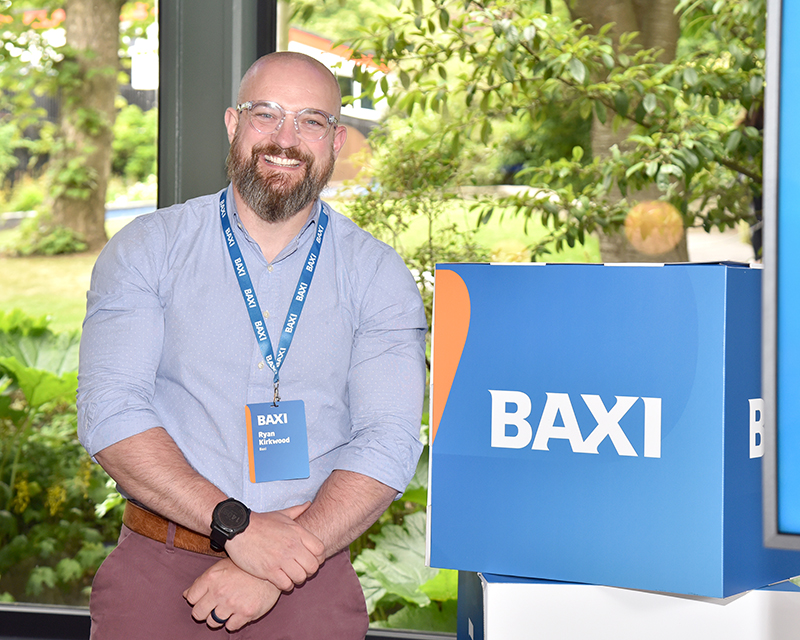
BAXI, a UK heating and hot water solutions specialist, has heralded Scotland as a ‘leader’ in decarbonisation, after choosing Edinburgh as the site of its first Commercial Solutions Showcase event.
The firm welcomed a crowd of over 50 new and existing customers to Edinburgh Zoo’s Gannet restaurant to discuss opportunities and approaches to heat decarbonisation in a changing landscape. The event opened with presentations outlining the Scottish Government’s policy framework relating to heat decarbonisation, all aligned with the eventual local climate goal of 2045 net zero.
With the direction of travel for heat clear, Baxi showcased its commercial low carbon solutions, including its Auriga HP+ high temperature air source heat pump range and AquaHeat Heat Interface Units (HIUs), as well as its full support services.
The company also chose Edinburgh as the launch site of its new and improved Quinta Ace series, now available with aluminium and stainless-steel heat exchanger options.
Phased hybrid options are seen by many as an achievable early step on the decarbonisation roadmap. The hybrid-ready innovation is billed as providing a solution to any project – regardless of location or water type – with Baxi adding that it offers enhanced quality, improved controls, advanced connectivity, easier installation, and greater sustainability.
Baxi’s customers additionally had the chance to see up close the new CHVAC Manager, a hybrid cascade management control for systems featuring gas boilers and ASHPs with automatic switching between the most efficient and/or preferred energy source.
“Scotland is leading the way with decarbonisation,” Ryan Kirkwood, engineering solutions manager at Baxi, told Project Scotland. “This is our first solutions showcase event and because of the Scottish Government’s leap forward in decarbonisation, we felt it was a very important place to start – and at a very iconic setting in Edinburgh surrounded by nature.”

Founded in 1866, Baxi has an extensive history of working across Scotland. Notable recent projects include Perth & Kinross Council’s Riverside Primary School, the country’s first Passivhaus-accredited primary school. With an Energy Use Intensity value of just 43 kWh/sqm/annum, Riverside Primary School is demonstrating strong energy performance whilst still providing ‘excellent’ comfort levels.
The school’s hot water strategy was identified as one of the main challenges in the design phase, with it imperative to avoid large-scale energy usage and heat loss. Working closely with BakerHicks Motherwell, the project M&E design team, Baxi identified its Heatrae Sadia point-of-use electric water heaters as a solution, with it generating energy only when required – such as at breaks or lunchtimes.
Also offering anti-legionella functionality, water pasteurisation, and an anti-tamper design, the project team noted the benefit of the units being sized – thus allowing more flexibility to meet required volumes and also ensuring the team could look to ‘design down’ and avoid oversizing.
“That project was fantastic. From early doors that early engagement (with the project team) was fantastic to ultimately build in that design influence from the start,” Ryan added. “They came to us with a problem, we worked with them, we developed a solution, and saw it all the way through installation with the contractor, to commissioning, and now the overall M&E of the building.”

Emphasising the importance of first ensuring the basics are correct, Ryan explained Baxi is keen to ensure clients don’t fall into the trap of ‘eco bling’ – whereby it’s assumed that simply throwing money at a problem will bring results.
Instead, a bespoke approach is taken, hedged on collaboration with the project to intrinsically understand the make-up of the building – from ventilation alterations post-Covid, to historical fabric improvements, and uses outside of school hours.
“We can end up in a situation where clients are paying a lot of money for what they think will fix their problem, but the impact isn’t necessarily what they were looking to achieve,” Ryan explained, before highlighting how ambitious environmental deadlines by governments and local authorities also places a need on doing things correctly.
“When we’re trying to achieve something in a shorter timeframe than it would ordinarily take, shortcuts may be taken and may be made,” he continued. “But it’s better to take the time and do it properly than to rush it. That’s one of the dichotomies we have; we know where have to get to, but it’s not a sprint; it’s a marathon.”
Aware of the expertise and changemakers who would be attending the event – which attracted merchants, designers, installers, and M&E contractors – Baxi also included interactive presentations and networking sessions to further promote collaboration.
“What’s really important is that everyone here is talking about sustainability and solutions. They’re sharing ideas, open sourcing their knowledge, and getting passionate about the next generation of heating systems,” Ryan said.
“The way we get better as an industry is to talk; we don’t silo our information – we make sure we’re open sourcing it, because that’s how we learn; if we have these pockets of siloed information then perhaps a solution that may have been perfect for one job sits on someone’s desk and never sees the light of day.”
Time was also taken by the Baxi product team to speak with customers on challenges they may have faced whilst installing or bringing its products to site, with intentions of using the feedback to develop products to maximise efficiency. “The key takeaway point is that everybody wants to learn,” Ryan concluded. “The conversations haven’t just been about sustainability and products, but conversations about how we actually upskill the entire industry to get better at what we need to do – we can’t use the skills of yesterday to get to where we need to be tomorrow.”








